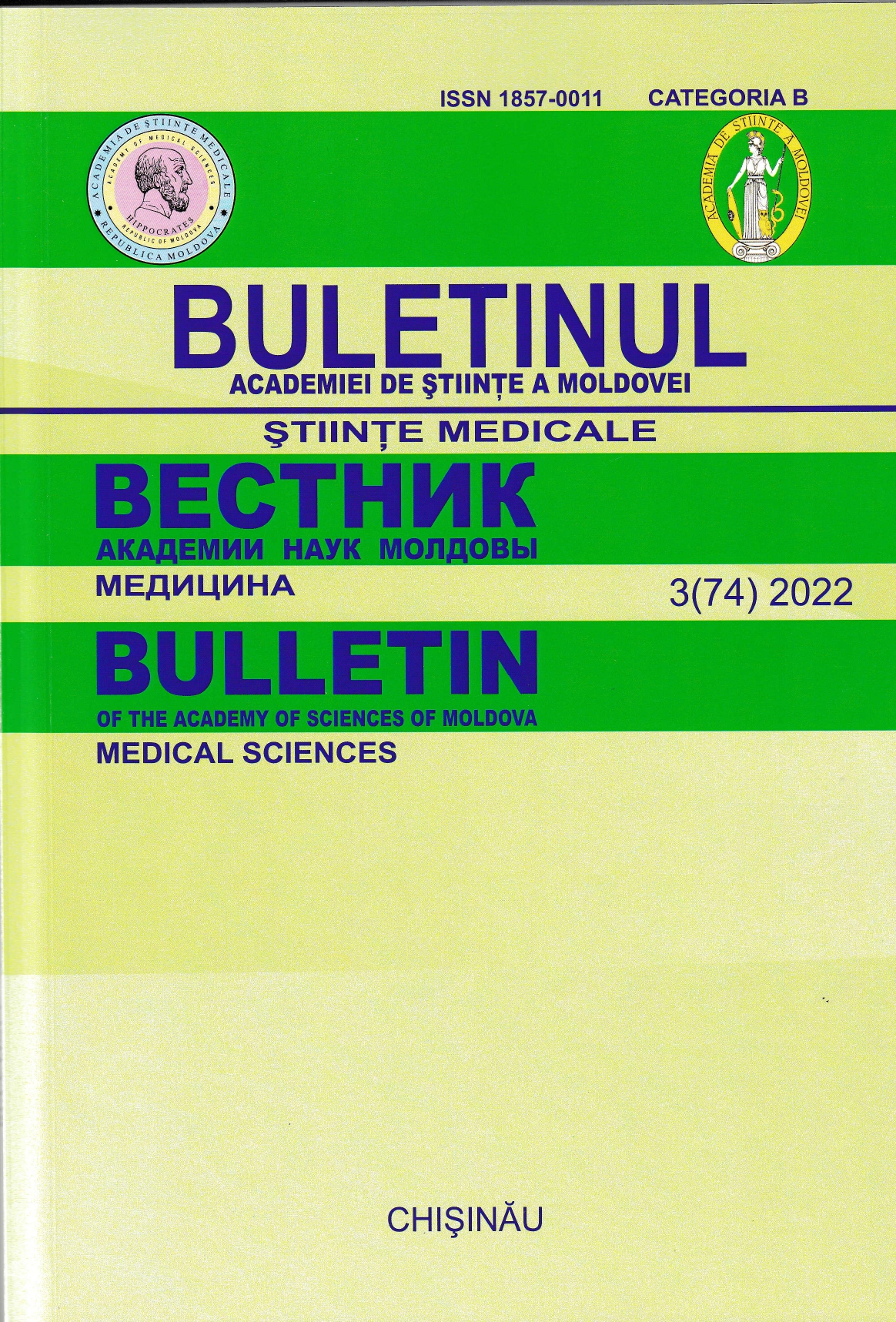Циркадные ритмы и нарушения сна у беременных
DOI:
https://doi.org/10.52692/1857-0011.2022.3-74.02Ключевые слова:
беременность , циркадные часы , циркадные нарушения, хронотерапия, сонАннотация
Циркадный ритм — это эндогенный процесс с периодичностью около 24 часов, который стимулирует ожидание повторяющихся и регулярных событий, происходящих ежедневно, что позволяет регулировать большинство
основных физиологических систем человека и животных. Таким образом, исследования показали, что нарушение
циркадного ритма и сна является частой причиной ряда патологий у населения в целом, в том числе у беременных
женщин и их плода. Целью данной статьи является проведение обзора литературы о взаимосвязи циркадианных
ритмов и нарушений сна у беременных и их влиянии на развитие плода, а также будущего развивающегося взрослого человека. Беременность является критическим периодом развития систем и органов нового организма человека, и любое нарушение среды, в которой растет плод, может привести к нарушениям развития, изменяющим
метаболические и физиологические функции плода. Таким образом, поддержание ненарушенного циркадного
ритма, в том числе во время беременности, защищает здоровье как матери, так и ребенка, снижая предрасположенность к развитию некоторых постнатальных заболеваний в более позднем возрасте.
Библиографические ссылки
Seron-ferre M, Valenzuela GJ, Torres-Farfan C. Circadian clocks during embryonic and fetal development. Birth Defects Res. (2007); 81(3):204–14.
Gamble KL, Ryan B, Frank SJ, Young ME. Circadian clock control of endocrine factors. Nat Rev Endocrinol. (2014), 10(8):466–75.
Tahara Y, Shibata S. Entrainment of the mouse circadian clock: effects of stress, exercise, and nutrition. Free Radic Biol Med. (2018), 119:129–38.
Kwon EJ, Kim YJ. What is fetal programming?: a lifetime health is under the control of in utero health. Obstet Gynecol Sci. (2017), 60(6):506–19.
Marciniak A, Patro-Małysza J, Kimber-Trojnar Z, Marciniak B, Oleszczuk J, Leszczynska-Gorzelak B. Fetal programming of the metabolic syndrome. Taiwan J Obstet Gynecol. (2017), 56(2):133–8.
Almond D, Currie J. Killing me softly: the fetal origins hypothesis. NIH Public Access. (2011), 25(3):153–72.
Pien GW, Schwab RJ. Sleep disorders during pregnancy. Sleep. (2004), 27(7):1405–17.
Sloan EP. Sleep disruption during pregnancy. Sleep Med Clin. (2008), 3(1):73–80.
M.J. Sateia. International classification of sleep disorders-Third edition highlights and modifications. Chest, 146 (2014), p. 11394, 10.1378/chest.14-0970.
Rosalia Silvestri, Irene Arico. Sleep disorders in pregnancy. Sleep Sci. (2019) Jul-Sep.
Lee KA. Alterations in sleep during pregnancy and postpartum: a review of 30 years of research. Sleep Med Rev. (1998), 2:231–242.
Hashmi AM, Bhatia SK, Bhatia SK, Khawaja IS. Insomnia during Pregnancy: Diagnosis and Rational Interventions. Pak J Med Sci. (2016), 32(4):1030-1037.
Abbott M, Attarian H, Phyllis C. Zee. Sleep disorders in perinatal women. Best Practice & Research Clinical Obstetrics & Gynaecology. (2014), 28(1):159-168.
Jee Hyun Kim, Jeanne F Duffy. Circadian Rhythm Sleep-Wake Disorders in Older Adults. Sleep Med Clin. (2018), 13(1):39-50.
Franklin KA, Holmgren PÅ, Jönsson F, Poromaa N, Stenlund H, Svanborg E. Snoring, pregnancy-induced hypertension, and growth retardation of the fetus. Chest. (2000), 117(1):137–141.
Hsu CN, Tain YL. Light and Circadian Signaling Pathway in Pregnancy: Programming of Adult Health and Disease. Int J Mol Sci. (2020), 21(6):2232.
Morssinkhof MWL, van Wylick DW, Priester-Vink S, van der Werf YD, den Heijer M, van den Heuvel OA, Broekman BFP. Associations between sex hormones, sleep problems and depression: A systematic review. Neuroscience & Biobehavioral Reviews, (2020), ISSN 0149-7634.
Lirong Zhu, Phyllis C Zee. Circadian rhythm sleep disorders. Neurol Clin. (2012). 30 (4): 1167–91.
Kim MJ, Lee JH, Duffy JF. Sleep and circadian rhythm disorders. Journal of Clinical Outcomes Management. (2013) 20 (11): 513–528.
Bao C, Xu L, Tang W, Sun S, Zhang W, He J, Zhao K, Xu D, Ye X. Poor Sleep and Decision-Making Disturbance Are Associated With Suicidal Ideation in Pre-natal Depression. Front Psychiatry. (2021), 12:680890.
Obeysekare JL, Cohen ZL, Coles ME et al. Delayed sleep timing and circadian rhythms in pregnancy and transdiagnostic symptoms associated with postpartum depression. Transl Psychiatry 10, 14 (2020). 10:14.
Bao C, Xu L, Tang W, Sun S, Zhang W, He J, Zhao K, Xu D, Ye X. Poor Sleep and Decision-Making Disturbance Are Associated With Suicidal Ideation in Pre-natal Depression. Front Psychiatry. (2021), 12:680890.
Margreet W Harskamp-van Ginkel, Despo Ierodiakonou, Katerina Margetaki, Marina Vafeiadi, Marianna Karachaliou, Manolis Kogevinas, Tanja G M Vrijkotte,Leda Chatzi. Gestational sleep deprivation is associated with higher offspring body mass index and blood pressure. Sleep. Volume 43, Issue 12, (2020), zsaa110,
Palagini L, Gemignani A, Banti S, Manconi M, Mauri M, Riemann D. Chronic sleep loss during pregnancy as a determinant of stress: impact on pregnancy outcome. Sleep Med. (2014), 15(8):853-859.
Warland J, Dorrian J, Morrison JL, O’Brien LM. Maternal sleep during pregnancy and poor fetal outcomes: A scoping review of the literature with meta-analysis. Sleep Med Rev. (2018), 41:197-219.
Miller MA, Mehta N, Clark-Bilodeau C, Bourjeily G. Sleep Pharmacotherapy for Common Sleep Disorders in Pregnancy and Lactation. Chest. (2020);157(1):184-197.
Hsu CN, Tain YL. Light and Circadian Signaling Pathway in Pregnancy: Programming of Adult Health and Disease. Int J Mol Sci. (2020), 21(6):2232.
Seeman MV. Why Are Women Prone to Restless Legs Syndrome? Int J Environ Res Public Health (2020), 17(1):368.
Miller MA, Mehta N, Clark-Bilodeau C, Bourjeily G. Sleep Pharmacotherapy for Common Sleep Disorders in Pregnancy and Lactation. Chest. (2020), 157(1):184197.
Buysse DJ. Sleep health: can we define it? Does it matter? Sleep. (2014), 37:9–17.
Banks S, Dinges DF. Behavioral and physiological consequences of sleep restriction. J Clin Sleep Med. (2007), 3:519–28.
Hauri P. Sleep hygiene. In: Hauri P, editor. Current Concepts: The Sleep Disorders. The Upjohn Company; Kalamazoo, MI: (1977). pp. 21–35.
Загрузки
Опубликован
Лицензия
Copyright (c) 2022 Вестник Академии Наук Молдовы. Медицина

Это произведение доступно по лицензии Creative Commons «Attribution» («Атрибуция») 4.0 Всемирная.



